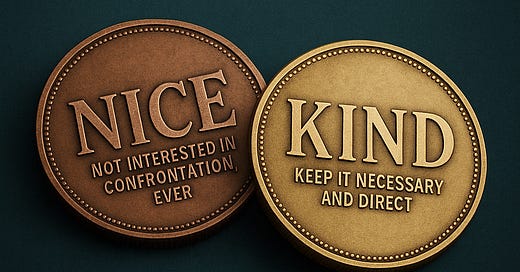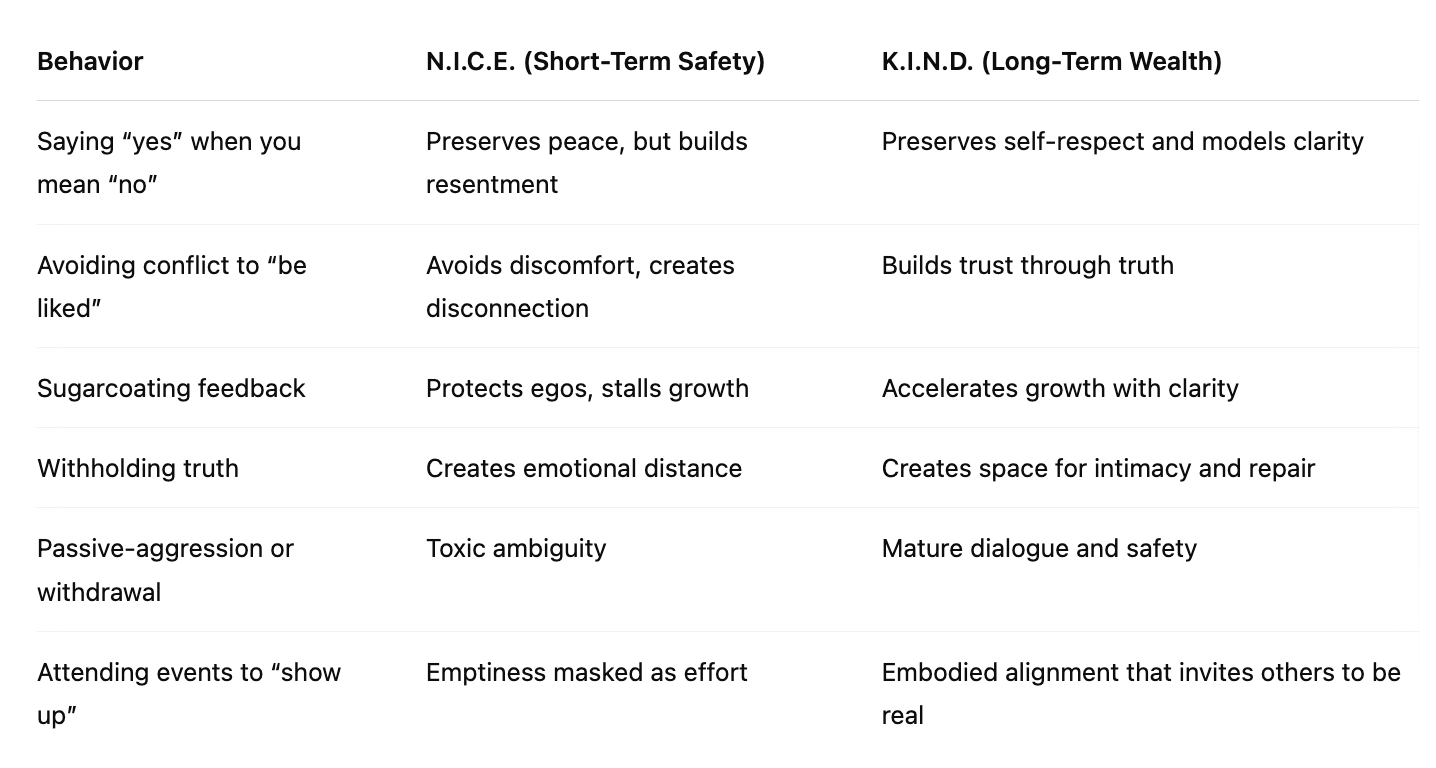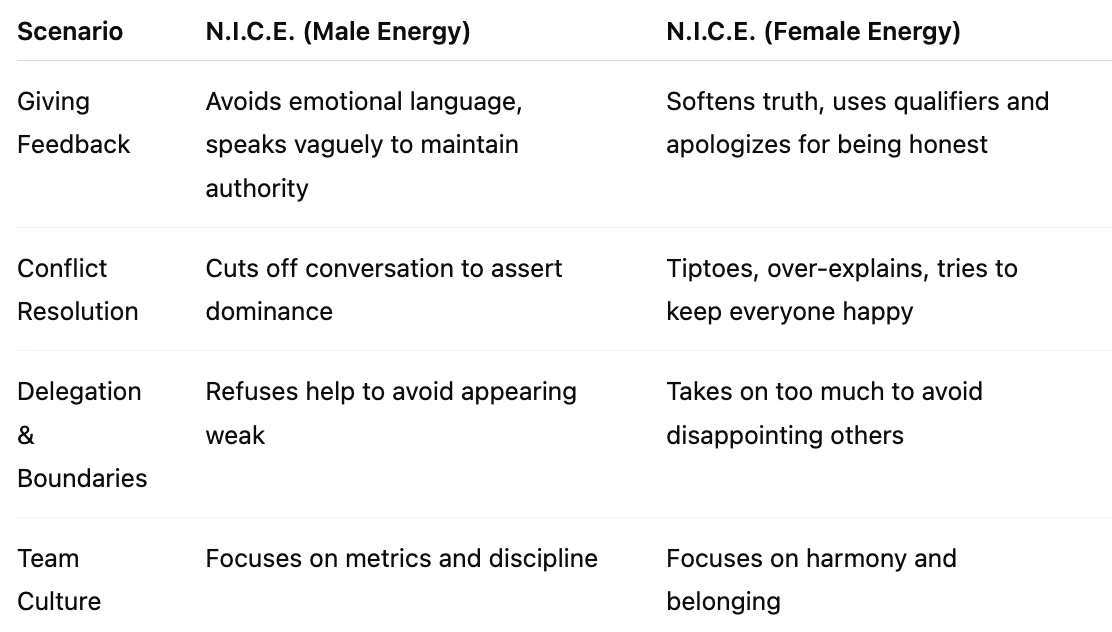The Currency You Spend Reveals the Power You Seek
Why Your Relational Bank Account Might Be Draining Even When You Think You’re “Nice”
This co-written and syndicated post with my ATOMIQ Opportunity Zone Fund partner came from a podcast discussion we had this past Tuesday on Clubhouse with the “Breakfast of Champions” channel. We felt it was timely, and so we are jointly publishing the key takeaways here.
We’ve all been taught — explicitly or by example — to be nice.
It starts young:
“Smile even when you’re uncomfortable.”
“Say you’re fine even when you’re not.”
“Don’t make waves.”
“Rock the boat? Absolutely not.”
“Play nice in the sandbox.”
“Keep the peace.”
“Put others first.”
“Don’t say what you really think — it’s not nice.”
“Be nice to your brother. Be nice to your sister.”
In homes, schools, boardrooms, and marriages, this kind of conditioning creates an emotional economy built on a polished, predictable, and passive-aggressive currency: the NICE coin.
And like any bad investment that looks good on paper, it depreciates fast.
But there’s a different currency available — one that might not earn applause in the short term, but pays long-term compound interest in trust, clarity, respect, and resilience.
That’s the KIND coin.
Let’s explore both currencies of the emotional economy—and why spending on KIND builds relational wealth, while over-investing in NICE slowly bankrupts your connection with others, as well as with yourself.
Note: This is bigger than just behavior. It’s vibrational. The difference between NICE and KIND isn’t just surface-level — it echoes into the Universal Law of Polarity.
In a dual world where up cannot exist without down, and light without dark, NICE and KIND are not merely personality traits.
They are frequencies. Energetic patterns.
One suppresses truth and lowers your vibration. The other honors truth and elevates your DNA to attract aligned relationships.
The currency you spend literally changes the chemistry of who you become — and who/what you magnetize.
The Currency of NICE — A Shiny Coin with Hidden Costs
N.I.C.E. = Not Interested in Confrontation, Ever.
Sounds familiar?
This is the default mode of someone who avoids friction at all costs — not because they don’t feel anger, sadness, or boundaries, but because they’ve been taught to bury them under a polished veneer of pleasantness. It’s the path of least resistance. It’s conflict avoidance disguised as virtue.
This is why someone being “so nice” can actually feel repulsive.
You don’t know why — they did “nothing wrong” — but something about it feels off. Hollow. You walk away feeling confused, even drained.
That’s because empty niceness carries no resonance. It mimics care without substance — and your nervous system picks up the misalignment.
The Double-Sided Trap of the NICE Coin
The trouble with NICE is that it feels like you're investing in peace, but you’re actually accruing emotional debt:
You say “yes” when you mean “no.”
You smile while secretly resentful.
You withhold the truth to “protect” others or to protect your image.
You enable dysfunction, hoping silence will magically restore harmony.
You manage appearances instead of addressing reality.
And the energy you carry? It repels the very connection you crave. Niceness becomes overextension. You give so much — and yet end up at the bottom of people’s list. You feel taken for granted, unappreciated, even invisible. You wonder: “Why don’t people treat me the way I treat them?”
Because what you’re offering isn’t a real connection.
It’s a performance.
And it leaves others — and yourself — with a bitter aftertaste.
Eventually, the bill comes due. Unspoken truths turn into tension.
Small betrayals stack. Your identity becomes fused with a persona that isn’t really you. And worst of all, you lose touch with your voice.
When you betray your needs in the name of “nice,” it becomes harder to trust yourself, let alone build relationships rooted in mutual respect, trust, and truth.
The Alternative Investment: The KIND Coin
Let’s flip the coin.
K.I.N.D. = Keep It Necessary and Direct.
This is the currency of relational wealth.
It’s clear. It’s respectful. It’s honest — even when it’s uncomfortable. And with practice, it becomes consistent.
Kindness doesn’t mean “always pleasant.” Kindness means truth, delivered with care. It rides on a wave of curiosity and courage.
It’s not about conflict avoidance. It’s about conflict fluency — the ability to enter discomfort and stay grounded, generous, and present.
Whereas NICE shuts down tension, KIND makes space for it — and moves through it.
KIND seeks to understand. It allows both parties to show up honestly. It offers room for growth, rather than scripts for control.
Why KIND Is the Richer Investment
Spending the KIND coin means:
You say what needs to be said, without cruelty or delay.
You take responsibility for your truth, even if it creates temporary discomfort.
You model emotional clarity rather than fostering confusion.
You foster trust because people know where you stand.
You stay true to your needs, boundaries, and values.
You offer substance, not superficial platitudes.
Here’s the irony: Kindness feels harder in the moment, but it’s the only path that prevents long-term damage.
Think of it like this:
NICE is like making minimum payments on a credit card while pretending you’re not in debt.
KIND is like budgeting honestly, spending with integrity, and investing in the long game — even if it feels tight right now.
NICE lives on the surface. KIND offers an invitation for something deeper. More meaning. More connection. More intimacy. More real.
Two Sides of the Relational Coin: NICE vs. KIND
Let’s break it down:
Breaking Down Male vs. Female Energy Expressions of NICE
But What About M.E.A.N.? — The Flip Side of the NICE Coin
Let’s be clear — Spending too much N.I.C.E eventually turns you into acting M.E.A.N.
M.E.A.N. = Manipulative Energy Avoiding Nuance.
Some people, tired of suppressing themselves, swing to the opposite extreme seemingly out of the blue.
MEAN is the blunt-force weaponization of truth:
Sarcasm instead of sincerity
Righteousness instead of curiosity
Oversimplification instead of complexity
Blame instead of ownership
This is the danger of skipping the KIND phase — reclaiming emotional honesty without emotional maturity.
It may feel liberating, but it’s still rooted in avoidance rather than empowerment.
And Why Is it Ok to Be R.A.W.?
Sometimes, you’re not NICE. You’re not MEAN.
You’re just R.A.W. = Respectful Awareness Withheld. This is the flip side of the KIND Coin.
You feel the tension. You know there’s something to say — but you’re not ready. That’s not suppression — it’s discernment.
RAW is the pause. The breath. The wisdom to wait until the energy is settled and the truth can be delivered cleanly.
Used wisely, R.A.W. is the pregame of KIND.
What We Were Modeled (And Why It Didn’t Work)
Most of us weren’t taught to be KIND. We were taught to be NICE.
Because that’s what our parents and mentors were modeled after.
They didn’t know that directness isn’t cruelty. They didn’t understand that truth doesn’t have to equal trauma.
So we inherited generations of repressed truth, polished performance, and relational bankruptcy. But we know better now. And that means we can choose differently.
How to Start Spending the KIND Coin
Audit your patterns.
Ask: Where am I being nice to avoid being real?Practice low-stakes honesty.
Start with: “Actually, I’m not up for that this week.” or “I felt a little off after our conversation.”Hold space without fixing.
Presence, not performance. Let others feel what they feel.Use the AND strategy.
“I love you and I need more space.”
“I value your leadership, and I disagree with that approach.”Remember: KINDNESS TAKES COURAGE.
When you tell the truth with love, you’re investing in long-term trust — even if it’s uncomfortable now.
Final Takeaways: Power Over vs. Power To
Every interaction is an investment. Every conversation is a transaction.
You are either:
Spending N.I.C.E. and accumulating emotional debt...
Or spending K.I.N.D. and compounding relational wealth.
And the most essential distinction?
When we spend the N.I.C.E. coin, we’re often seeking power over people — through control, approval, or image.
When we spend the K.I.N.D. coin, we’re choosing to empower others — through honesty, respect, and real connection.
One hoards safety by suppressing the truth.
The other creates safety by telling it.
The choice isn’t always easy. But it is yours.
And the return on investment — in clarity, alignment, and peace — is worth everything.
Let’s grow together,
~Chris J Snook &







